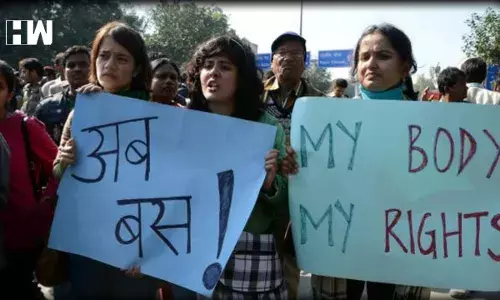New Delhi: The Delhi high court has asked the Union government to clarify its position in principle on the issue of criminalising marital rape after the government sought time to formulate and place its considered stand.
Justice Rajiv Shakdher, who is heading the bench dealing with a batch of petitions challenging the legality of the marital rape exception in the Indian Penal Code (IPC), said that the Union government has to say ‘yes’ or ‘no’, citing that in issues such as the present one deliberations will not end otherwise.
“In a matter like this, they (the Union government) have to in principle say yes or no because if they don’t, however much they may deliberate, it is not going to come to an end,” the judge said.
Solicitor General Tushar Mehta said that it will not be appropriate to place before the court a less discussed and consulted stand and time was needed to undertake the process of consultation.
“I don’t mind that (consultation) but they have to take a decision which way they are going there are some matters, for whatever reasons, I think the court ultimately decides one way or the other and that’s how it gets resolved. You take your time,” Justice Shakdher observed.
“Yes and no is the end product of consultation,” responded the Solicitor General who also submitted that nothing imminent was going to happen within a couple of weeks.
“We have to formulate our stand and place our considered stand for your lordship and considering that this a 2015 matter if your lordship can grant us a reasonable time. This might need a little consultation, etc.,” the solicitor general said.
The bench, which also comprised Justice C. Hari Shankar, said that it would continue to hear other lawyers appearing in the case which would give time to the Centre.
“You come back. We will decide how much time to give you then,” the bench told the solicitor general.
Justice Hari Shankar also advised that the court has to take a “dispassionate view in this.”
“Let us not have these caveats. I don’t see how the provision says in the context of wife, rape is permissible,” he said, referring to an exception in Section 375 which is interpreted to mean that sexual intercourse by a husband with wife as not rape and hence, could it be seen as giving protection from the offence of rape.
The bench is hearing PILs filed by NGOs RIT Foundation, All India Democratic Women’s Association, a man and a woman seeking striking down of the exception granted to husbands under the Indian rape law.
Justice Shankar said that there should be a dispassionate attitude in the case and that the issue of criminalising marital rape should prima facie be viewed from the perspective of the act and not of a married or unmarried woman.
The judge reiterated that a married relationship entailed the expectation of intercourse, which was legally and socially recognised.
The petitioners have challenged the constitutionality of the marital rape exception under section 375 IPC on the ground that it discriminated against married women who are sexually assaulted by their husbands.
The hearing in the case will continue on January 18.
As an independent media platform, we do not take advertisements from governments and corporate houses. It is you, our readers, who have supported us on our journey to do honest and unbiased journalism. Please contribute, so that we can continue to do the same in future.

